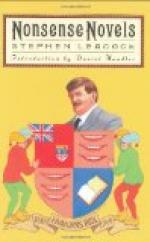The old clock struck twenty minutes past eight.
Again a knock sounded at the door.
There entered the familiar figure of the village lawyer. His astrachan coat of yellow dogskin, his celluloid collar, and boots which reached no higher than the ankle, contrasted with the rude surroundings of the little room.
“Enderby,” he said, “can you pay?”
“Lawyer Perkins,” said the farmer, “give me time and I will; so help me, give me five years more and I’ll clear this debt to the last cent.”
“John,” said the lawyer, touched in spite of his rough (dogskin) exterior, “I couldn’t, if I would. These things are not what they were. It’s a big New York corporation, Pinchem & Company, that makes these loans now, and they take their money on the day, or they sell you up. I can’t help it. So there’s your notice, John, and I am sorry! No, I’ll take no buttermilk, I must keep a clear head to work,” and with that he hurried out into the snow again.
John sat brooding in his chair.
The fire flickered down.
The old clock struck half-past eight, then it half struck a quarter to nine, then slowly it struck striking.
Presently Enderby rose, picked a lantern from its hook, “Mortgage or no mortgage,” he said, “I must see to the stock.”
He passed out of the house, and standing in the yard, looked over the snow to the cedar swamp beyond with the snow winding through it, far in the distance the lights of the village far away.
He thought of the forty years he had spent here on the homestead—the rude, pioneer days—the house he had built for himself, with its plain furniture, the old-fashioned spinning-wheel on which Anna had spun his trousers, the wooden telephone and the rude skidway on which he ate his meals.
He looked out over the swamp and sighed.
Down in the swamp, two miles away, could he have but seen it, there moved a sleigh, and in it a man dressed in a sealskin coat and silk hat, whose face beamed in the moonlight as he turned to and fro and stared at each object by the roadside as at an old familiar scene. Round his waist was a belt containing a million dollars in gold coin, and as he halted his horse in an opening of the road he unstrapped the belt and counted the coins.
Beside him there crouched in the bushes at the dark edge of the swamp road, with eyes that watched every glitter of the coins, and a hand that grasped a heavy cudgel of blackthorn, a man whose close-cropped hair and hard lined face belonged nowhere but within the walls of Sing Sing.
When the sleigh started again the man in the bushes followed doggedly in its track.
Meanwhile John Enderby had made the rounds of his outbuildings. He bedded the fat cattle that blinked in the flashing light of the lantern. He stood a moment among his hogs, and, farmer as he was, forgot his troubles a moment to speak to each, calling them by name. It smote him to think how at times he had been tempted to sell one of the hogs, or even to sell the cattle to clear the mortgage off the place. Thank God, however, he had put that temptation behind him.




